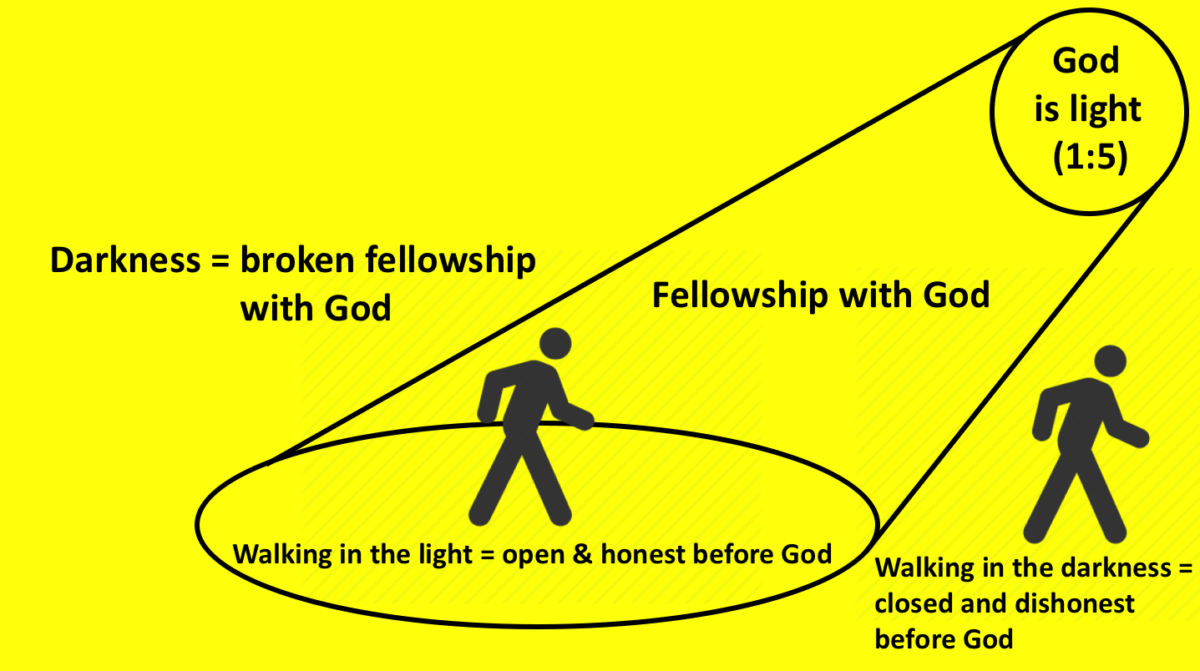“His parents said these things because they feared the Jews, for the Jews had agreed already that if anyone confessed that He was Christ, he would be put out of the synagogue. Therefore his parents said, ‘He is of age; ask him.’ ” John 9:22-23
As we continue to look at the man born blind whom Jesus healed (John 9:1-12), we will discover a third symptom of spiritual blindness. After the parents of this healed man testified that this was their son who was born blind (John 9:20), they would not tell the Pharisees how their blind son gained his sight. They said, “But by what means he now sees we do not know, or who opened his eyes we do not know. He is of age; ask him. He will speak for himself.” (John 9:21). They said nothing about how or by whom he received his sight because they were afraid of being excommunicated from the synagogue. They evade this issue by saying their son was an adult capable of answering for himself.
“22 His parents said these things because they feared the Jews, for the Jews had agreed already that if anyone confessed that He was Christ, he would be put out of the synagogue. 23 Therefore his parents said, ‘He is of age; ask him.’ ” (John 9:22-23). The parents say nothing of Jesus. If these parents allowed their son to beg, then it was unthinkable for them to confess Christ before the Pharisees. Because no one could conduct business with a person who was excommunicated from the synagogue.
The Jews had three types of excommunication:
1. The Nezifah (“reproof”), the mildest formwas applied “when someone had insulted a prominent or learned person. It lasted seven days and the offender could not appear before the one he displeased. He had to retire to his house, speak little, refrain from business and pleasure, and manifest his remorse.” 1
2. The Niddui (“separation), was imposed when “the offender was first publicly warned three times at the regular service in the synagogue. During the period of discipline … (30 days according to the Jerusalem Talmud) no one except the members of his immediate household were permitted to associate with the offender, or sit within four cubits of him, or eat in his company. He had to observe all the laws that pertained to a mourner and could not be counted among the number necessary for the performance of a public religious function.” 2
3. The Barem (“ban”), “was the most rigorous form of excommunication. This extended for an indefinite period during which no one was permitted to teach the offender, work for him, or benefit him in any way. It meant exclusion from the religious community and intercourse with Jewish society.” 3
Whatever form of excommunication was enforced then, the threat was serious enough to keep the parents quiet about the identity of their son’s Healer. This is the third symptom of spiritual blindness – DESIRE THE APPROVAL OF OTHERS AT THE EXPENSE OF THE TRUTH (John 9:21-23). The parents of the former blind man withheld the truth about Jesus as the Christ (Messiah) because they did not want to be excommunicated from the synagogue and lose the opportunity to do business with others. In other words, they wanted the approval of the religious leaders but not the approval of God.
How many people have avoided the truth to please others? Maybe you come from a strong religious background and if you embraced the truth about Jesus Christ, you would suffer persecution from your family and religious community. Believing in a generic God is safe, but confessing Jesus Christ as the Messiah-God will bring opposition ranging from ridicule and mockery, to possible torture and death.
The sad part of this is people can end up in hell because they sought to preserve their own lives and livelihood like the parents of the man born blind instead of seeking the truth about Jesus Christ. Let’s put this in perspective. Would you rather avoid temporary sufferings on earth by rejecting Jesus Christ and then experience eternal punishment and torment in the lake of fire after you die or would you rather endure temporary sufferings on earth now by believing in Jesus Christ for eternal life to possess eternal bliss and joy in heaven with Jesus after you die? Is your comfort now more important than your comfort in eternity? Many people will be separated from God forever in the lake of fire because they sought the approval of people instead of seeking the truth about Jesus Christ. What will you choose?
The Bible says, “He who believes in the Son has everlasting life; and he who does not believe the Son shall not see life, but the wrath of God abides on him.” (John 3:36). Heaven and hell are in the balance my friends. If you do not believe or trust in Christ alone as your only hope of heaven simply to avoid suffering on earth now, you will regret this forever as you suffer torment in the lake of fire. On the other hand, if you will transfer all your trust onto Jesus Christ, Who died for your sins and rose from the dead, for His gift of everlasting life now, you will enjoy Jesus’ presence forever in a perfect and problem-free place called heaven.
If you are a believer in Jesus, it is possible to have a reluctance to express that faith publicly for fear of persecution. For example, many of the ruling Pharisees had saving faith but were afraid to express that faith to others because they loved the approval of people more than God’s approval: “42 Nevertheless even among the rulers many believed in Him, but because of the Pharisees they did not confess Him, lest they should be put out of the synagogue; 43 for they loved the praise of men more than the praise of God.” (John 12:42-43).
Does this sound familiar to you? We do not want to speak up for Christ because we are afraid of what people will think or do to us. When we refuse to openly tell others about Jesus’ saving grace, we are no longer walking in the light. We are hiding in the darkness because we are ashamed of the precious cleansing blood of Jesus Christ (I John 1:7; 2:22-23; 4:15). When we turn away from God to please people, we are telling God, “I don’t want Your praise, Father. I don’t need it!” In other words, we are out of fellowship with God (I John 4:15).
It is important to understand that confessing Christ before others is not a condition for receiving eternal life. Only believing in Jesus is necessary for salvation from hell (John 3:14-16, 36; 5:24; Acts 16:31; Ephesians 2:8-9). God can see our faith in Christ alone apart from any good works or outward manifestation (Romans 3:21-4:5; Ephesians 2:8-9; Titus 3:4-7). But confessing Christ before others is necessary to grow in our Christian lives.
Romans 10:9-10 is referring to believing in your heart “unto righteousness” which is justification before God (Romans 3:21-5:9a) and confessing with your mouth for salvation from the present-day wrath of God (Rom. 1:16-32; 5:9-10) which is sanctification or growing in the Christian life (Rom. 5:9b-8:39). Failure to confess Christ before others now, will result in the loss of eternal rewards at the Judgment Seat of Christ, particularly, the loss of ruling with Christ in the world to come (Matthew 10:32-42; 2 Corinthians 5:8-11; 2 Timothy 2:12).
Let’s make every day count for eternity. As a Christian, live for the audience of One, Jesus Christ, and He will make your life eternally worthwhile (Colossians 3:23-24; Revelation 22:12).
Prayer: Lord Jesus, thank You for reminding me that my choices now will determine what my eternity will be like. The most important decision anyone can make is what they will do with You, Lord Jesus. Will they believe in You for Your gift of everlasting life and enjoy eternity with You in heaven or will they choose not to believe in You and suffer torment forever separated from You in the lake of fire!?! I beg of You, my Lord and my God, to remove the blinders from those who are more concerned about their comfort on earth than about their comfort for eternity. Help them to believe that You, Jesus, are the Christ, the Son of God, that believing they may have eternal life in Your name alone. For those of us who believe in You, Jesus, please enable us to live for Your approval and not the approval of people. In Your everlasting name I pray. Amen.
ENDNOTES:
1. J. Carl Laney, Moody Gospel John Commentary (Chicago: Moody Press, 1992), pp. 177-178.
2. Ibid, p. 178.
3. Ibid.




